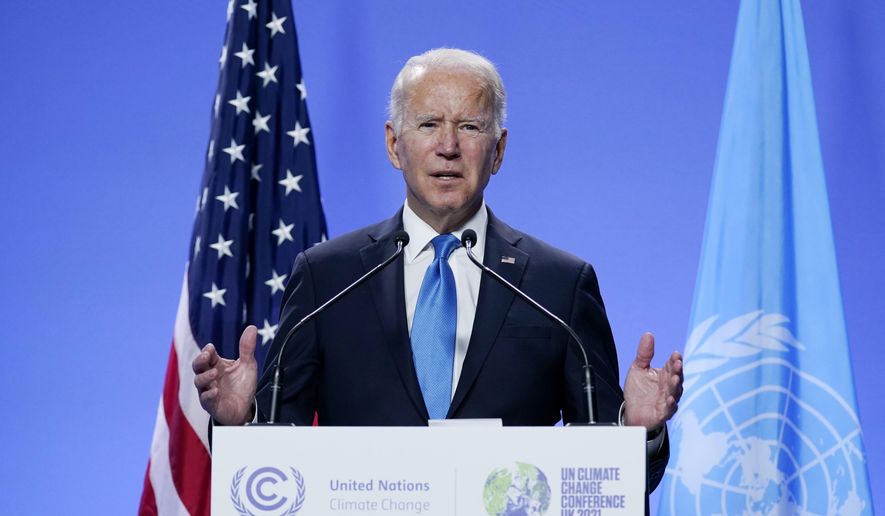Small businesses could be shut out of lucrative government contracts because of the massive compliance costs imposed under a proposed Biden administration rule that would require large federal contractors to reduce and publicly disclose their greenhouse gas emissions.
The proposed rule would make the U.S. the first national government to require major federal contractors to set climate goals in line with the 2015 Paris Agreement.
Administration officials say using the federal government’s purchasing power as a private-sector cudgel could eliminate roughly 85% of greenhouse gas emissions associated with the federal supply chain. That’s more than twice the emissions generated from the 300,000 buildings and 600,000 vehicles that the federal government owns outright, the White House said in a fact sheet.
“Requiring major federal suppliers to disclose emissions and risks strengthens our supply chain and brings us closer to reaching our net-zero emissions goals,” Brenda Mallory, chair of the White House Council on Environmental Quality, said in a statement.
Yet the compliance costs are enormous. The proposed rule estimates that the federal contracting industry would incur $604 billion in implementation costs in the first year and a little more than $442 billion annually after that.
Those costs could impose a significant burden on small businesses, which may not be able to afford compliance. Instead, the businesses may pass on high-income federal contracts, leaving the sector to larger businesses that can more easily absorb the costs.
Christoph Mlinarchik, a government contracts expert and the author of three books on the subject, said small businesses could struggle under the proposal.
“Piling up compliance costs disproportionately hurts small businesses that have razor-thin profit margins and less flexibility to spread these costs across many contracts,” he said. “In contrast, giant government contractors benefit from overregulation. These barriers to entry keep out competitors and new entrants, especially small businesses and innovative technology companies that America desperately needs.”
The Biden administration has argued that the rules will ultimately benefit businesses because increased brand awareness and enhanced innovation will offset compliance costs. Federal contractors that have already started reducing emissions have reported a combined 1.8 billion metric ton reduction in carbon emissions and $29 billion in cost savings annually.
It’s not clear how many of those contractors are small businesses or larger companies such as Raytheon or General Dynamics, which are among the largest government suppliers.
It’s also not known how much of the compliance costs were passed along to taxpayers, who are on the hook for federal contracts.
“Eventually, increased costs of compliance get passed to American taxpayers through higher prices for government contracts. Jumping through compliance hoops burns money that must be recovered through higher prices — simple economics. Don’t forget that money spent on government contracts belongs to the taxpayer, not federal agencies nor Congress,” Mr. Mlinarchik said.
Under the proposal, companies that do more than $50 million in annual business with the federal government would have to establish carbon reduction targets that line up with the Paris Agreement. Those suppliers would also be required to publicly disclose greenhouse gas emissions that are found in their supply chains and caused by their products.
That would affect 1,353 entities, of which 389, or 29%, would qualify as small businesses, according to government data.
The rule would also require contractors that receive more than $7.5 million but less than $50 million in business from the federal government to disclose the greenhouse gas emissions from their operations, but not supply chains or products. They wouldn’t be required to set emissions reductions.
Government data shows that 4,413 contractors would be affected by the proposal. Among those, 2,835, or 64%, would be considered small businesses.
Among businesses that do more than $50 million in annual business with the government, only 31% currently disclose greenhouse gas emissions. Of the companies that do more than $7.5 million but less than $50 million in annual government contracts, 10% disclose greenhouse gas emissions, according to government data.
The data doesn’t specify the extent of the disclosures.
Markus Speidel, a government contracts attorney, said the compliance costs would be significant. He said contractors will have to invest time and money to develop emissions-measuring methods as well as a system to disclose the data. That would rack up legal and other bills, he said.
Mr. Speidel cautioned that the proposal is among a slew of Biden administration initiatives to leverage its power as a buyer of billions of dollars in goods and services to push its climate goals. That means more stringent proposals affecting contractors could be on the way.
“This proposed rule is probably the tip of the iceberg. I think, generally, there is going to be a greater push for this in the future and the early adopters will get an advantage,” he said. “If you turn away from government contracts to find greener pastures elsewhere, you won’t last too long.”
The Securities and Exchange Commission proposed a rule this year requiring all publicly traded companies to disclose to investors their direct emissions. The rule would also make companies divulge their product and supply chain emissions if they pose a direct financial risk to the business.
The administration’s new emissions rule proposal doesn’t offer a specific reduction threshold for contractors, making it somewhat byzantine. It simply says that companies must meet the goals of the Paris Agreement, which limits warming to 2 degrees Celsius (3.6 degrees Fahrenheit) and pursue a goal of limiting warming to 1.5 degrees Celsius (2.7 degrees Fahrenheit).
The regulation will remain open for public comment for 60 days before the Biden administration can establish and enforce the provisions, which could take weeks or months.
• Jeff Mordock can be reached at jmordock@washingtontimes.com.




Please read our comment policy before commenting.